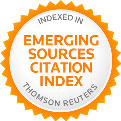Football clubs ownership and management. The fans perspective. [Propiedad y gestión de los clubes de fútbol. La perspectiva de los aficionados].
Resumen
Two decades after the entry into force of the law that stimulated the conversion of the football clubs into public limited sports companies (Sport Law of 1990), this article presents an investigation on the perceptions that the fans have of its configuration and functioning. The changes that have taken place in the ownership and management of the clubs are examined from the point of view of the fans, as well as the consequences that these changes have had in their relation with the clubs. Following the presentation of the process that led to the transformation of the Spanish clubs of football in public limited sports companies, the main results of a qualitative research with 25 football fans were interviewed are presented. The conclusions point at the existence of a feeling of symbolic property of the clubs that, though in the last seasons might be weakening, it determines the perception that the fans have of their transformations. The study also shows that in the current football scenario the fans see themselves as mere spectators, a condition that provokes distancing, indifference and apathy towards all that does not have to do with the game of the team.
Resumen
Dos décadas después de que entrara en vigor la ley que impulsó la transformación de los clubes de fútbol profesional en Sociedades Anónimas Deportivas (Ley del Deporte de 1990), este artículo presenta una investigación sobre las percepciones que los aficionados tienen de su configuración y funcionamiento. Se examina la valoración que los aficionados efectúan de los cambios que se han producido en la estructura de propiedad y gestión de los clubes, así como las consecuencias que estos cambios han tenido en sus relaciones con ellos. Tras exponer el proceso que condujo a la transformación de los clubes de fútbol españoles en Sociedades Anónimas Deportivas, se presentan los resultados de una investigación cualitativa en la que se entrevistó a 25 aficionados al fútbol. Las conclusiones apuntan a la existencia de un sentimiento de propiedad simbólica de los clubes que, aunque en los últimos años podría estar debilitándose, condiciona la percepción que los aficionados tienen de las transformaciones de estos. El estudio también pone de manifiesto que en el actual escenario futbolístico, los aficionados se ven como meros espectadores, una condición que provoca distanciamiento, indiferencia y apatía hacia todo aquello que no tiene que ver con el juego del equipo.
http://dx.doi.org/10.5232/ricyde2014.03502
---------------------------------------------------------------------
References/referencias
Bale, J. (2000). The Changing Face of Football: Stadiums and communities, Soccer and Society, 1 (1): 91-101.
http://dx.doi.org/10.1080/14660970008721251
Brown, A, (2007). Not For Sale? The Destruction and Reformation of Football Communities in the Glazer Takeover of Manchester United, Soccer and Society, 8 (4): 614-635.
http://dx.doi.org/10.1080/14660970701440972
Brown, A. (2008). 'Our club, our rules': fan communities at FC United of Manchester, Soccer and Society, 9 (3): 346-358.
http://dx.doi.org/10.1080/14660970802008967
Cleland, J. A. (2010). From passive to active: the changing relationship between supporters and football clubs, Soccer and Society, 11 (5): 537-552.
http://dx.doi.org/10.1080/14660970.2010.497348
Coombs, D. S. & Osborne, A. (2012). A Case Study of Aston Villa Football Club. Journal of Public Relations Research, 24: 201-221.
http://dx.doi.org/10.1080/1062726X.2012.671985
Friberg, F. & Öhlen, J. (2007). Searching for knowledge and understanding while living with impending death: A phenomenological case study, International Journal of Qualitative Studies on Health and Well-being, 2: 217-226.
http://dx.doi.org/10.1080/17482620701523777
Giulianotti, R. (2002). Supporters, Followers, Fans and Flaneurs: taxonomy of Spectator Identities in Football. Journal of Sport and Social Issues, 26 (1): 25-46.
http://dx.doi.org/10.1177/0193723502261003
Giulianotti, R (2005). Sport Spectators and the Social Consequences of Commodification- Critical Perspectives from Scottish Football. Journal of Sport and Social Issues 29: 386-410.
http://dx.doi.org/10.1177/0193723505280530
Gray, G. T. & Wert-Gray, S. (2012). Customer retention in sports organization marketing: examining the impact of team identification and satisfaction with team performance. International Journal of Consumer Studies, 36 (3), pp. 275-281.
http://dx.doi.org/10.1111/j.1470-6431.2011.00999.x
Hamil, S.; Michie, J.; Oughton, C., & Warby, S. (2000). Recent Developments in Football Ownership. Soccer and Society, 1 (3): 1-10.
http://dx.doi.org/10.1080/14660970008721275
Kennedy, D. (2012). Football stadium relocation and the commodification of football: The case of Everton supporters and their adoption of the language of commerce. Soccer and Society, 13 (3): 341-358.
http://dx.doi.org/10.1080/14660970.2012.655504
Kennedy, P. & Kennedy, D. (2010). 'It's the little details that make up our identity': Everton supporters and their stadium ballot debate, Soccer and Society, 11 (5): 553-572.
http://dx.doi.org/10.1080/14660970.2010.497349
Lomax, B. (2000). Democracy and Fandom: Developing a Supporters' Trust at Northampton Town FC. Soccer and Society, 1 (1): 79-87.
http://dx.doi.org/10.1080/14660970008721250
Millward, P. (2012). Reclaiming the Kop? Analysing Liverpool Supporters' 21st Century Mobilizations. Sociology, 46: 633-648
http://dx.doi.org/10.1177/0038038511425557
Moor, L. (2007). Sport and commodification: A reflection on key concepts. Journal of Sport and Social Issues, 31 (2): 128-142.
http://dx.doi.org/10.1177/0193723507300480
Morrow, S. (1999). The New Business of Football, MacMillan: Basingstoke.
http://dx.doi.org/10.1057/9780230371743
Nauright, J. & Ramfjord, J. (2010). Who owns England's game? American professional sporting influences and foreign ownership in the Premier League. Soccer and Society, 11 (4): 428-441.
http://dx.doi.org/10.1080/14660971003780321
Nash, R. (2000). Contestation in modern English professional football: The Independent Supporters Association Movement. International Review for the Sociology of Sport, 35: 465-486.
http://dx.doi.org/10.1177/101269000035004002
Sewart, J. (1987). The Commodification of Sport. International Review of Sociology of Sport, 22 (3): 171-191.
http://dx.doi.org/10.1177/101269028702200303
Walsh, A. & Giulianotti, R. (2001). This sporting mammon: a normative analysis of the commodification of sport. Journal of the Philosophy of Sport, 28: 53-77.
http://dx.doi.org/10.1080/00948705.2001.9714600
Watkins, T, (2000). Cherries in the Black: AFC Bournemouth's journey from bankruptcy to rude health under supporter leadership. Soccer and Society, 1 (3): 57-63.
http://dx.doi.org/10.1080/14660970008721283
Williams, J. (2007). Rethinking Sports Fandom: The case of European soccer. Leisure Studies, 26 (2): 127-146.
http://dx.doi.org/10.1080/02614360500503414
---------------------------------------------------------------------
Palabras clave/key words
------------------------ 0 -------------------------
RICYDE. Revista Internacional de Ciencias del Deporte
![]()

Publisher: Ramón Cantó Alcaraz
ISSN:1885-3137 - Periodicidad Trimestral / Quarterly

